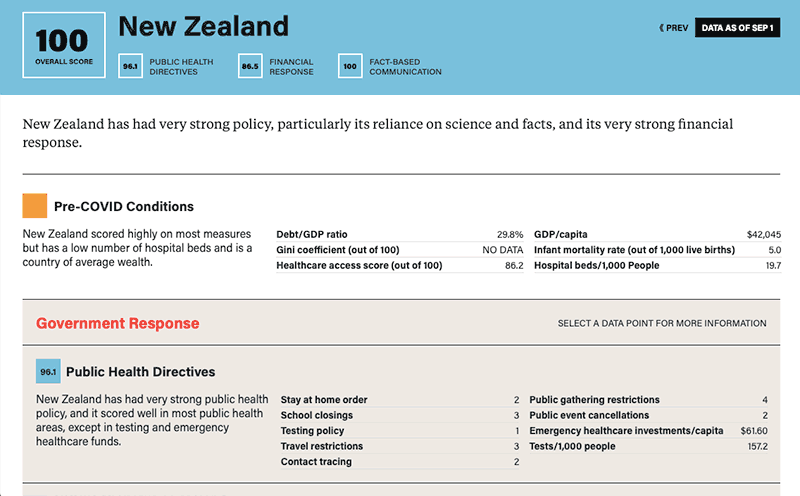They’ve been disproportionately affected by job losses, and now new jobs may first go to men.
India
- Data as of Aug 1
- Next 》
- 78.4 Public Health
Directives - 64.1 Financial
Response - 60 Fact-Based
Communication
- 78.4 Public Health
Directives - 64.1 Financial
Response - 60 Fact-Based
Communication
India scores just above the median, a large drop-off in recent months, keyed by substantial weakening of restrictions and worsening financial support.
Pre-COVID Conditions
India’s weak healthcare system, poor population health, very low number of hospital beds, and low GDP-per-capita resulted in it being vulnerable to the pandemic.
- Debt/GDP ratio 68.1%
- GDP/capita $9,027
- Gini coefficient (out of 100) 37.8
- Infant mortality rate (out of 1,000 live births) 30
- Healthcare access score (out of 100) 44.8
- Hospital beds/1,000 People 4.4
Government Response
Select a data point for more information(Data points represent policy level as of Aug 1.)
Public Health Directives
India’s public health policy directives score relatively strongly, with limited testing and low emergency healthcare spending countering relatively strong school and public restrictions.
- Stay at home order 1
- Public gathering restrictions 3
- School closings 3
- Public event cancellations 2
- Testing policy 2
- Emergency healthcare investments/capita $0.91
- Travel restrictions 4
- Tests/1,000 people 0.4
- Contact tracing 2
Financial Response
India’s relatively strong score is driven by its wide-ranging debt forbearance and relief, but its stimulus is fairly small, and it offers median levels of income support for workers, many of whom are employed in the informal sector or in migrant work.
- Financial stimulus as share of GDP 9.7%
- Income support 1
- Debt forebearance 2
Fact-Based Communication
Across the country, Indian journalists have been arrested for sedition or spreading “fake news” in response to their reporting on the state’s handling of COVID-19.
- Reliance on science/fact based information 0
- Press freedom 2
COVID-19 Status as of Aug 1
India has performed consistently strongly in this category across all subcategories, particularly with its low death rate; however, numbers are recently spiking following easing of lockdown restrictions.
- Total deaths 36,511
- Death rate per 100K 26.5
- Total cases 1,695,988
- Cases per 100K 1,229
- Percent of positive tests 10.2
| Date | Status | New Cases/1M | |
|---|---|---|---|
| 1 | Apr 29 | Government permits stranded people to travel within the country | 1.18 |
| 2 | Jun 08 | Restaurants, offices, malls, and places of worship reopen | 6.84 |
Differentiating Factors
- Hospitals overloaded: India's healthcare system is largely privatized, but private hospitals are being forced to close as staff contract coronavirus, and have reportedly been refusing to treat COVID patients. Despite requisitioning up to 80 percent of private hospital beds in Mumbai and New Delhi, authorities are still unable to treat the scale of infections. Read More
- Rapid re-opening undoes early successes: In early July, India overtook Russia to become the country with the third-highest number of confirmed cases. This came one month after the re-opening of shopping centres, places of worship and offices, demonstrating the importance of India's initial lockdown to keeping cases down. Read More
- Sudden lockdown caused mass migration: India's lockdown was announced just four hours before it came into place, leading to a mass migration effect as urban migrant workers attempted to travel home. This migration has been identified as a major facilitator of spread, and has put strain on rural medical infrastructure. Read More
Compared with the Nearest Countries in the Index
-
35.3China 87,655
Cases 61
Per 1M 4,661
DeathsChina’s aggressive lockdowns played a key role in controlling case and death rates. However, its low score is driven by multiple factors, including the country’s minimal financial response and lack of press freedom and fact-based communications. China’s failure to report testing obscures understanding of actual COVID-19 dynamics within the country.
-
0Iran 304,204
Cases 3,622
Per 1M 16,766
DeathsIran has a very weak policy score, due largely to very weak public health policy, driven by a severe lack of testing and substantial misinformation and press limitations by the national authorities.
-
41.2Russia 839,981
Cases 5,756
Per 1M 13,963
DeathsRussia has a relatively weak score, with strong public health policy undone by weak financial support, limitations on press freedom, and spread of misinformation about the pandemic.
Further Reading From Foreign Policy
Be the source of actionable insight.
Select one of the subscription options below to read the full Covid-19 Global Response Index. Unlock even more global intelligence with a subscription to FP Insider.
Already an FP Insider? Log In
Looking for group access? Contact us directly

Statistics and government response factors available on each country profile include:
Pre-COVID Conditions:
- Debt to GDP ratio
- Infant mortality rates
- Hospital beds per 1,000 people
- Gini coefficients measuring inequality
- Health access and quality
COVID-19 Public Health Directives:
- Stay-at home orders
- School-closing policy
- Public-gathering restrictions
- Cancellation of public events
- Testing policy and rates per 1,000 people
- Emergency healthcare spending per capita
- Travel restrictions
- Contact tracing
COVID-19 Financial Response:
- Stimulus package as a share of GDP
- Income support
- Debt-forbearance
Public Communications:
- Instances of misinformation by leadership
- Limitations on press freedom, censorship
Current/Historic In-Country COVID-19 Status:
- Death rates per 1 million
- Case rates per 1 million







